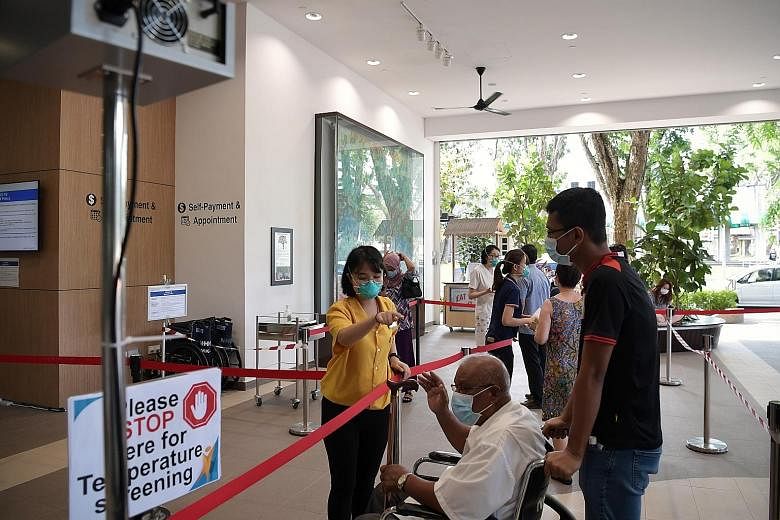Doctors here say they expect more cases of acute respiratory infection (ARI) as Singapore's economy continues to reopen, following a drop in the number of such cases during the circuit breaker period.
Healthcare professionals The Straits Times spoke to said there are a number of possible reasons for the fewer cases.
Dr Edwin Chng, medical director of Parkway Shenton, said that the chain's 42 Public Health Preparedness Clinics have seen an 80 per cent drop in ARI cases since the start of the circuit breaker, with each clinic seeing fewer than 20 such cases a day.
"This is probably because of the effective measures imposed by the Government during the circuit breaker," he told ST on Monday.
Dr Tan Liat Leng, a general practitioner (GP) at EH Medical Clinic, posited an alternative explanation: "It could be because people are working from home and feel that a medical certificate won't make much of a difference, or because their symptoms are so mild they prefer to treat it themselves."
But a third possibility is that patients are afraid of the potential consequences of visiting a clinic while they have an ARI, said family physician Aziz Noordin.
Dr Aziz, who practises at Tampines Family Medicine Clinic, said many of his ARI patients told him they were hesitant about getting a check-up because they were worried about having to be tested for Covid-19.
"There's always a question of what happens if I'm positive, what happens to my family, my kids," he said, adding that such concerns need to be addressed.
Family physician Quah Soon Wee of Crossroads Family Clinic, which saw a 50 per cent drop in ARI patients over the circuit breaker period, had the same theory.
"They may be afraid of being swab-tested, or of having to take five days' medical leave," he said.
Patients with ARI have been the focus of Covid-19 swab testing as part of efforts to contain the spread of the disease here.
-
Signs of acute respiratory infection
From today, anyone aged 13 and older who has an acute respiratory infection (ARI) will be tested for Covid-19 once they see a doctor.
Such infections affect the sinus, nose, throat or lungs - and may or may not be accompanied by a fever. A sore throat, cough or runny nose would fall under this category. In some cases, these symptoms may be due to other underlying non-ARI reasons, such as acid reflux, allergies or asthma.
As these symptoms - no matter how mild - may also be the result of Covid-19, people should see a doctor if they have any of them. A doctor will be able to tell what the cause is after noting the patient's clinical history, and determine whether he needs to be tested for the coronavirus.
Such tests are relatively painless and take less than a minute, and the results will be produced in under two days.
Last Thursday, the Ministry of Health (MOH) said anyone aged 13 and above with ARI would be tested from July 1.
Since March, about 600 of Parkway Shenton's patients have been swabbed for the coronavirus as a result of having an ARI, said Dr Chng.
Northeast Medical Group's medical director Tan Teck Jack said the group's nine clinics had also been swabbing about 20 such patients a day before phase two of Singapore's reopening.
As activities have started to pick up, his clinic has seen a 30 per cent to 40 per cent increase in the number of patients with ARI.
"It appears that more people are mixing and getting an ARI because of increased human-to-human contact... This reflects the social nature of this disease," he said.
While MOH has set out the general symptoms of ARI as being cough, sore throat, runny nose and loss of sense of smell, determining if one of these symptoms is due to an ARI and not something else is up to the individual doctor.
Dr Tan Liat Leng said that as GPs deal with ARIs most of the time, they are experienced enough to tell the difference.
"If you have a cough, it's usually the case that you have an ARI. However, if it goes on for very long with no fever, it could be due to something else," he said.
"If there are symptoms like fever or body aches, we will treat it as an ARI."
Other reasons for having ARI-like symptoms could include underlying conditions such as asthma or allergies, or a patient being a smoker, said Dr Quah.
However, he advised against patients self-diagnosing.
"The tricky thing about Covid-19 is that a lot of patients present with very mild symptoms, so even a slight cough could be due to Covid-19. It's hard for patients to tell on their own, so it's recommended that they see us."
The doctors urged people with symptoms of ARI to get a check-up, even if it means undergoing a swab test. They all gave the assurance that the test is quick and relatively painless.












